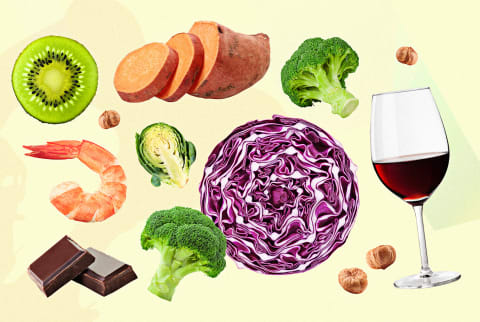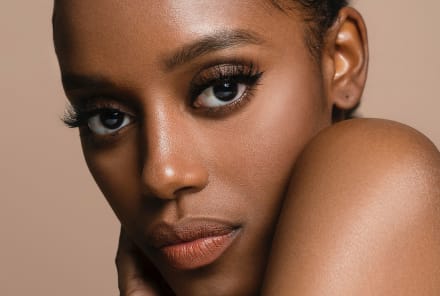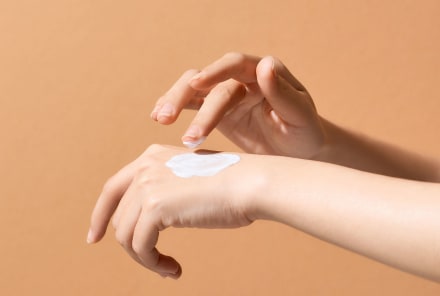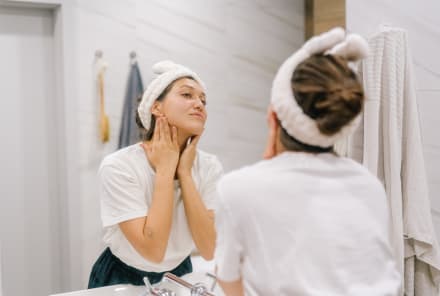Advertisement
Photoaging & Antioxidants: 5 Powerful Options For Healthy Skin



You've probably also heard about the topical benefits of antioxidants: staving off free radicals that can cause oxidative stress and UV-induced photodamage. (By now, you likely know which antioxidants to seek out in your skin care products, and if not, no worries—head over here). However, protecting your skin against harmful UV rays is also an inside job. That is, when you consume certain antioxidants as part of your daily diet or supplement regimen, they can help support your skin's defense against the sun.*
What is photoaging, and what can antioxidants do to help?
"Skin photoaging is a result of the oxidative stress from UV radiation," explains board-certified dermatologist Kautilya Shaurya, M.D. "Your skin naturally produces antioxidants; however, as your skin ages, these antioxidant levels often decrease." Which is precisely why replenishing antioxidant levels—both topically and internally—can have such a profound effect on overall skin health. When ingested, antioxidants can protect the skin against photoaging by both absorbing UV rays and preventing UV-induced free radical damage1, per recent research. Here, five of the best antioxidants that help prevent photoaging:
Astaxanthin
This scientific-sounding antioxidant has become a favorite for skin care fanatics lately. It is recognizable by its pink-red hue. "Astaxanthin is a carotenoid [that] causes the red/pink color in red algae, as well as in seafood such as salmon, shrimp, and lobster," Shaurya says. Carotenoids, a subgroup of antioxidants, provide similar benefits as their other antioxidant counterparts.*
"All antioxidants work against damage caused by ultraviolet rays in the same way [to] counter free oxygen radicals in the skin that are caused by sunlight," explains board-certified dermatologist Nava Greenfield, M.D. "Antioxidants neutralize those molecules so that damage is avoided."*
Research has confirmed astaxanthin's outstanding ability to help skin manage photodamage2, as one scholarly review of the antioxidant explained that numerous comparative studies of astaxanthin and other antioxidants showed was the superior antioxidant in promoting dermal fibroblasts (or, what helps make skin cells, elastin, and collagen).* To give you an idea of just how powerful, the free-radical-fighting effect of astaxanthin is up to 1,000 times higher3 than that of many of its fellow antioxidants. "If taken orally, [astaxanthin] has been shown to manage skin damage caused by the sun," Shaurya confirms.*
Vitamin C
"Vitamin C is a water-soluble antioxidant that can be found in the skin cells, and [it] acts as the first defense against free radicals found in the blood and plasma," Shaurya says. However, unlike most other mammals, humans cannot produce their own vitamin C4, and therefore must consume it. Not only can humans not produce it naturally, but it's easily depleted in the body: When skin is unprotected against prolonged UV exposure, its natural vitamin C reserves in the epidermal layer5 begin to deplete. Vitamin C is also a necessary component of the body's natural collagen6 production process, and collagen is precisely what keeps our skin looking healthy and youthful. Remarkably, research has confirmed a direct link between higher vitamin C intake and healthier skin appearance7.*
The good news: Various studies have found that increased vitamin C intake—via fruits, vegetables, or supplements with high levels of the antioxidant—can promote skin elasticity, tone, and texture8 and stave off fine lines and wrinkles (all of which are common signs of photoaging).* Some of the best vitamin-C-rich foods9 to incorporate into your rotation include vegetables such as red and green peppers, broccoli, Brussels sprouts and cabbage, and fruits including oranges10, grapefruits, strawberries, and kiwi.
3. Vitamin E
Another crucial antioxidant that works internally to stave off skin photoaging11, "Vitamin E helps manage the damage to enzymes and cell membranes," Shaurya explains. "It also prevents free radicals from damaging the skin when they are active."*
Some of the richest food sources of vitamin E are spinach, nuts (including sunflower seeds, almonds, hazelnuts, pine nuts, and peanuts), whole grains, and olive oil. Other studies have also confirmed vitamin E's beneficial effects in warding off sun-induced skin conditions12 and skin aging.*
4. Beta-carotene
"Beta-carotene works in similar ways to [astaxanthin]," Greenfield says, citing kale and sweet potatoes as some of the top food sources of the antioxidant. Research13 has shown that an increased intake of beta-carotene significantly supports skin health, resulting in smoother skin and elasticity—again, the most common and visible markers of photodamage.* It's able to do so by directly absorbing UV rays14 and, in turn, preventing cellular damage. Beta-carotene "is [also] plentiful in carrots, peppers, and other plants and fruits with an orange color," Shaurya says.
5. Resveratrol
These colorful compounds are what gives raspberries and red wine their deep hue, and they are also extremely beneficial for skin health1.* Resveratrol has been shown to help manage UV-induced skin damage15, suggesting that it may be useful in the prevention of signs of skin aging.* Some of the best foods to consume to up your resveratrol intake include grapes, peanuts16, blueberries, dark chocolate, and, yes, red wine.
The bottom line:
"Eating a well-balanced diet with lots of variety in fresh fruits and vegetables is a great way to ensure you are consuming all the antioxidants, vitamins, minerals your body needs to stay healthy and protected," Greenfield explains. However, "no amount of food will replace sun protection from regular use of sunscreen." If you find yourself not getting enough of these antioxidants in your day-to-day diet, or you'd just like to help support your body, consider a supplement.*
16 Sources
- https://www.ncbi.nlm.nih.gov/pmc/articles/PMC6098906/
- https://www.ncbi.nlm.nih.gov/pmc/articles/PMC5946307/
- https://www.tandfonline.com/doi/abs/10.1080/15421406.2013.804380
- https://www.nature.com/scitable/topicpage/the-mystery-of-vitamin-c-14167861/
- https://www.ncbi.nlm.nih.gov/pmc/articles/PMC5579659/
- https://www.ncbi.nlm.nih.gov/pmc/articles/PMC4562654/
- https://academic.oup.com/ajcn/article/86/4/1225/4649573
- https://www.ncbi.nlm.nih.gov/pubmed/25600848
- https://ods.od.nih.gov/factsheets/VitaminC-HealthProfessional/
- https://academic.oup.com/ajcn/article/78/3/454/4689971?itm_medium=sidebar&itm_content=ajcn&itm_source=trendmd-widget&itm_campaign=trendmd-pilot
- https://www.ncbi.nlm.nih.gov/pmc/articles/PMC4976416/
- https://www.ncbi.nlm.nih.gov/pmc/articles/PMC3789494/
- https://www.ncbi.nlm.nih.gov/pubmed/20516658
- https://academic.oup.com/ajcn/article/96/5/1179S/4577133
- https://www.ncbi.nlm.nih.gov/pubmed/18221451
- https://www.ncbi.nlm.nih.gov/pubmed/12010007











